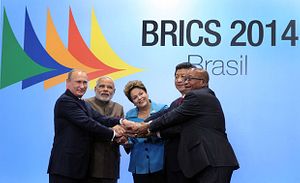Although the tragic incident of MH17 now attracts global attention, the real big news last week was the establishment of the BRICS development bank at the BRICS summit in Brazil, which has long-term implications for global order and development. Not everybody would agree on the importance of the BRICS bank, but the creation of the BRICS bank is significant for future international order for three reasons.
First, it demonstrates the viability and dynamics of the BRICS despite all the skepticism and criticism in recent years. Some of the criticisms (here and here) are legitimate as BRICS nations have experienced slower growth lately; even China’s economic growth appears to be slowing down due to a variety of reasons. Critics of the BRICS bank also point to different views among the members as evidence of serious problems of the bank. But this misses the point. There always will be different opinions and views among the BRICS countries, just like there are differences among G7 members. What is important, however, is whether member states share a major common goal that can unite them despite differences. The answer is: development. Unlike G7 member states, BRICS members are largely still developing countries and this situation means that for a long time these countries will focus on how to improve the living standards of their citizens. Also, other developing countries are desperate in need of funding for infrastructure projects.
Second, the BRICS bank demonstrates China’s global leadership. Given China’s huge size and quick development, there is little doubt that the world truly needs China’s leadership. What China needs to be careful about is to maintain a balance between its own influence on the bank and other members’ impact. It is thus critical for China to avoid the impression that China dominates the BRICS bank. Unlike the U.S., China should not try to impose its own will and rules on other members and developing countries seeking funding from the bank. This is especially the case when BRICS members do have diverging interests and even conflicting interests (such as territorial disputes between China and India) among themselves. China should not use the BRICS bank as a platform to only advance its own national interests such as the Renminbi’s internationalization; instead, China should promote equality with the bank as a common platform for all developing countries to realize their development dreams. Thus it is a good sign that although Shanghai has been chosen as the headquarters of the new bank, the first president will be Indian the first chairman of the board of governors will be Russian, the first chairman of the board of directors will be Brazilian, and the first regional center of the bank will be in South Africa.
Third, the BRICS bank is significant because it is a direct challenge to the global order led by the West. Many view (here and here) the new BRICS bank as a response to the failed reforms at the IMF and World Bank as developing countries like China and India cannot increase their influence within those institutions. However, it should be kept in mind that the BRICS bank is not currently challenging the international liberal economic order. China and India are perhaps the two greatest beneficiaries of an open liberal economic order; and thus the BRICS bank should try to push the IMF and World Bank to be more open and transparent. Ultimately the competition between the BRICS bank and the IMF and World Bank should be about efficiency rather than a struggle between liberal vs. alternative economic philosophies. In this sense, there is a strong complementary relationship between the BRICS bank, the IMF and the World Bank. That said, the West, the IMF and the World Bank should not view the BRICS bank as a threat to their domination of the global economic order;
To be sure, the new BRICS development bank is unlikely to replace the IMF and World Bank in the near future as the latter will still remain powerful players in the global economic order. The most likely relationship between the two is a complementary relationship rather than a conflicting one. That said, in the long run the competition between the two will intensify and the final outcome will depend on the balance of power between the two blocs: the developing world and the developed world. What is for sure is that we are in for some interesting times.

































